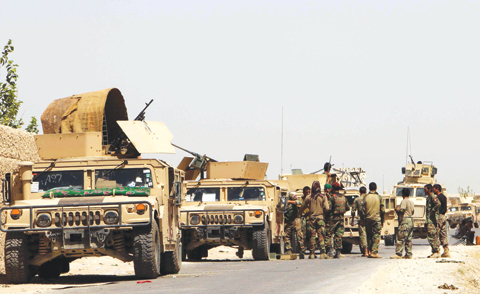 UKUMAT-E NAD 'ALI, Afghanistan: Afghan security personnel prepare for combat during an ongoing battle with Taleban militants in the Nad Ali district of Helmand yesterday.- AFP
UKUMAT-E NAD 'ALI, Afghanistan: Afghan security personnel prepare for combat during an ongoing battle with Taleban militants in the Nad Ali district of Helmand yesterday.- AFPNEW DELHI: Afghan forces, backed by the United States, have killed an estimated 300 Islamic State fighters in an operation mounted two weeks ago, the top US and NATO commander in Afghanistan said yesterday, calling it a severe blow to the group. General John Nicholson said the offensive in the eastern province of Nangarhar was part of US operations to degrade the capabilities of Islamic State wherever it raised its head, whether in Iraq and Syria or in Afghanistan.
The group, believed to be confined to three or four of the more than 400 districts in Afghanistan, last month claimed responsibility for bombing a demonstration by the Shiite Hazara minority in the capital, Kabul, in which at least 80 people were killed. Nicholson, in New Delhi for talks with the Indian military which has provided training and some arms to Afghanistan, said Afghan forces supported by the United States had just carried out a counter-terrorism operation against Islamic State.
"They killed a number of top leaders of the organization and upto 300 of their fighters," he told reporters. "Obviously it's difficult to get an exact count, but what this amounts to is about 25 percent of the organization at least, and so this represents a severe setback for them." Islamic State first appeared in Afghanistan at the beginning of 2015, and had about 3,000 fighters at the height of the movement, many of them former members of militant groups such as the Pakistani Taleban and the Islamic Movement of Uzbekistan.
Previously considered a much smaller threat than its bitter enemies the Taleban, the group's bomb attack in Kabul underlined how dangerous it could be, even without holding large tracts of territory. On Tuesday, another US military official said American soldiers helping Afghan troops fight Islamic State in Nangarhar were forced to abandon equipment and weapons when their position came under fire.
Fighters from the group had circulated photographs of a rocket launcher, grenades, ammunition, identification cards, an encrypted radio and other equipment they said they had seized. By being more aggressive, the Afghan military were more successful this year against the Taleban than in 2015, when they lost 5,000 men, Nicholson said. The killing of Afghan Taleban chief Mullah Mohammad Akhtar Mansour in a US drone strike in Pakistan had been a greater blow to the group than they had let on, partly because the Taleban were having trouble getting control of the finances he dealt with, Nicholson said.
Taleban closing in
Meanwhile, Afghan troops are being deployed to the capital of the key southern province of Helmand amid intense fighting with the Taleban in surrounding areas and fears the city could fall to the insurgents within days, officials said yesterday. According to Kareem Atal, the head of Helmand's provincial council, Taleban insurgents have completely surrounded Lashkar Gah after weeks of intense fighting across the province. Army and police units have now been pulled back from checkpoints farther afield and brought back to reinforce the city. Also, "new forces are arriving" in the city, he added.
The fighting has closed all the highways leading into Lashkar Gah, forcing up prices for food and other basics inside the provincial capital, Atal said. Doctors Without Borders, the international medical charity, has reduced its international staff in Lashkar Gah and is maintaining basic emergency and surgical services, said the country representative Guillem Molinie. The charity, known by its French acronym MSF, has a 300-bed hospital in the city and usually functions with 25 international staff. Molinie would not say how many staff had been evacuated.
He said that the number of people arriving for treatment after being caught up in fighting in districts around the city had been reduced in recent days by the road closures. "With fears of the town being taken, non-emergency patients prefer to delay their treatment," he said, though 400 patients arrived at the hospital's emergency room on Tuesday. "We are concerned about urban fighting - it is getting closer to the urban center," he said.- Agencies









